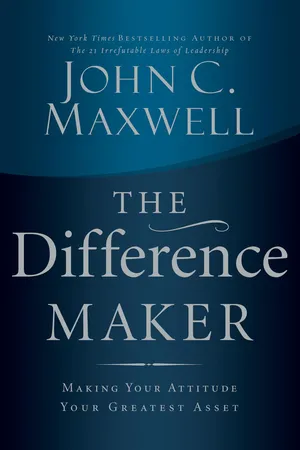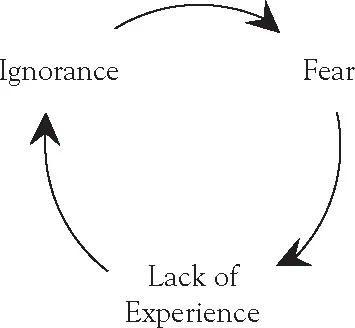Let me assert my firm belief that the only thing we have to fear is fear itself—nameless, unreasoning, unjustified terror which paralyzes needed efforts to convert retreat into advance. In every dark hour of our national life a leadership of frankness and vigor has met with that understanding and support of the people themselves which is essential to victory. I am convinced that you will again give that support to leadership in these critical days.1
What most people did not know is that the president had personally experienced some dark hours in which fear paralyzed him. Roosevelt was born a child of privilege and was educated in Europe, at Harvard, and at Columbia Law School. In his late twenties, be became a state senator and followed his term in office serving as assistant secretary of the navy. But in 1921 at age thirty-nine, Roosevelt was stricken with a severe case of polio that left him severely debilitated.
During his recovery, Roosevelt developed an extreme fear of fire. He worried that he would not be able to escape a fire because of his disability. But in time, Roosevelt overcame his fear. He regained the use of his hands, and he even learned to walk again with the aid of braces. And he reentered the political arena—fearlessly campaigning to become the governor of New York, which he did in 1929. He went on to become one of the nation’s greatest presidents.
FEAR IS PART OF THE HUMAN CONDITION
We tend to think that successful people somehow are exempt from experiencing fear, but nothing could be further from the truth. Every generation in human history has experienced fear. It goes all the way back to Adam and Eve. After they disobeyed God and He called to them, Adam answered, “I heard Your voice in the garden, and I was afraid because I was naked; and I hid myself.”2
Fear is part of human nature, and it always has been. Trace through human history and you can find plenty of quotes on fear. Here are just a few:
ο Lucretius (ca. 60 B.C.) “For as children tremble and fear everything in the blind darkness, so we in the light sometimes fear what is no more to be feared than the things children in the dark hold in terror and imagine will come true.”
ο Michel Eyquem de Montaigne (1580) “The thing I fear most is fear.”
ο Francis Bacon (1623) “Nothing is terrible except fear itself.”
ο Duke of Wellington (1831) “The only thing I am afraid of is fear.”
People today are also fearful. According to psychiatrist James Reich, 3 percent of all Americans experience panic, 6 percent agoraphobia, 3 percent generalized anxiety, 2.5 percent simple phobias (fear of a specific situation, object, creature, experience, or activity), and 1.5 percent social phobias (dread of situations that involve interaction with other people).3 That means one in six people have serious issues with fear. On a lighter note, a psychiatrist who was guest on the original Tonight Show told host Steve Allen, “The only two really instinctive fears in men are the fear of loud noises and the fear of falling.” He then asked, “What are you afraid of, Mr. Allen?” The host’s response: “I have a great fear of making a loud noise while falling.”
Of course, most people’s fears are more ordinary. Surveys done by the Barna Research Group indicate that four out of five adults face major difficulties in life which really concern them. Their worries break down this way:
Finances 28%
Health 19%
Career concerns 16%
Parenting struggles 11%
Family relationships 7%
Accomplishing personal goals 7%4
Your greatest fears may not be included in this list, but I’m certain that you experience some kind of fear.
THE DESTRUCTIVE EFFECTS OF FEAR
Fear can be a very destructive force in a person’s life. The root of the word fear comes from the Old English word fæ´r, literally meaning a sudden attack, and is akin to the Old High German word fa¯ra meaning ambush or snare.5 That’s what fear does to us: It attacks us and makes us captive. As psychiatrist and Nazi concentration camp survivor Viktor Frankl observed, “Fear makes come true that which one is afraid of.”
The destructive power of fear, if left unchecked, can be devastating. Here are just some of the negative things fear can do in a person’s life:
1. FEAR BREEDS MORE FEAR
The most insidious thing about fear is its ability to exaggerate itself. C. Everett Koop, former surgeon general of the Unites States, observed, “People have an inappropriate sense of what is dangerous.” If you’re not convinced about that statement, then think about this. Are you afraid of flying? Did you know that you are more likely to die choking on a piece of food than in a commercial airline crash? Afraid of dying in a robbery? You are twice as likely to be killed playing a sport than you are to be stabbed to death by a stranger. Are you afraid of sharks? Every year barnyard pigs kill more people than sharks do. Worried about having surgery? You are sixteen times more likely to die in a car crash than you are to die of complications from surgery.
Seldom does the thing we fear come to pass. In our minds, we project coming disasters that will likely never occur. And when they don’t come to pass, we think, “Phew, that was a close one!” when the reality is that our own thoughts were the only thing creating potential danger for us.
2. FEAR CAUSES INACTION
A census taker was going far into a rural area to finish the work in his territory. Driving down the country roads, he saw many houses with “Beware of Dog” signs. At the gate of the last address on his list, he saw another “Beware of Dog” sign as he entered a farmyard near a barn.
Afraid to get out of his car, he honked his horn, and soon a man came out of the barn with a small Chihuahua at his heels.
When the census taker was done asking his questions and filling out his paperwork, he mentioned how many beware-of-dog signs he had seen and asked, “Is this the dog all the signs are about?”
“Yup, sure is,” the farmer replied, picking up the friendly dog.
“But that dog couldn’t keep anyone away.”
“I know,” said the farmer, “but the signs sure do.” The lesson is that fear is like a warning sign that makes us afraid of a dog that cannot hurt us!
People who let some kind of fear get hold of them find themselves increasingly more fearful. It can create a debilitating cycle. Here’s how this often works.
Fear makes us afraid of doing something that might be beneficial for us. Taking action will require us to move into the unknown. That can be scary. But if we give in to our fear, we don’t move forward. We don’t receive the benefit of what we avoided, nor do we gain the valuable experience that would make us better informed. As a result, we remain ignorant about that area of life, and ignorance almost always breeds more fear, making it that much harder to push ahead and get things done.
We cannot allow fear to paralyze us. As John F. Kennedy observed, “There are risks and costs to a program of action, but they are far less than the long-range risks and costs of comfortable inaction.” If we are too afraid of failure, we probably will never win. If we are afraid to die, we will hardly live. Everything in life has some degree of risk.
3. FEAR WEAKENS US
Harry Truman, thirty-third president of the United States, remarked, “The worst danger we face is the danger of being paralyzed by doubts and fears. This danger is brought on by those who abandon faith and sneer at hope. It is brought on by those who spread cynicism and distrust and try to blind us to our great chance to do good for all mankind.”
Fear and anxiety are debilitating emotions. They are interest paid in advance on a debt you may never owe. And they undermine faith—in ourselves, in others, and in God.
| Fear | Faith |
| Weakens | Strengthens |
| Imprisons | Liberates |
| Paralyzes | Empowers |
| Disheartens | Encourages |
| Sickens | Heals |
Nineteenth-century preacher and author C. H. Spurgeon stated, “Our anxiety does not empty tomorrow of its sorrows, but only empties today of its strengths.” A person cannot allow fear to master him and become the master of his strengths at the same time. It just doesn’t happen.
4. FEAR WASTES ENERGY
An old German adage says, “Fear makes the wolf bigger than he is.” Because of that, when people let fear get hold of them, they expend valuable energy in ways they shouldn’t. How? Sometimes they avoid things that can’t really harm them, like the man who returned to his vacation cabin from a hike badly scratched and bruised. “What happened?” asked his wife.
“I met a snake on the trail,” the man answered.
“Don’t you remember?” the woman responded. “The ranger told us yesterday that none of the snakes up here are poisonous.”
“They don’t have to be poisonous if they can make you jump off a twenty-foot cliff!”
Clearly the man’s fear—not the snake—was the problem.
Other times people waste energy fantasizing about solutions to problems they fear will come their way. Ironically, what started as an unfounded fear can turn into a real problem because a person wasted energy on wishful thinking instead of productive action. Joe Tye, author of Never Fear, Never Quit, says,
Wishful thinking is the lock that fear puts on the prison gate. Fear...





